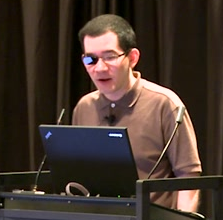Quick Q: How can I speed up this nested loop with cout? -- Quora
Quick A: Enable more asynchrony and buffering. Boost can help.
Recently on Quora:
How can I minimize the runtime of the following loops: ... ?
int j=0; while (j <n) { int i = 0 ; while (i<m) { cout<<" ("<<i<<","<<j<<")"<<endl; i++; } j++; }
From the first answer:
... That's 16 times faster than the first version.

 While we wait for CppCon 2015 in September, we’re featuring videos of some of the 100+ talks from CppCon 2014. Here is today’s feature:
While we wait for CppCon 2015 in September, we’re featuring videos of some of the 100+ talks from CppCon 2014. Here is today’s feature: A solid and entertaining treatment with good C++ examples:
A solid and entertaining treatment with good C++ examples: While we wait for CppCon 2015 in September, we’re featuring videos of some of the 100+ talks from CppCon 2014. Here is today’s feature:
While we wait for CppCon 2015 in September, we’re featuring videos of some of the 100+ talks from CppCon 2014. Here is today’s feature: